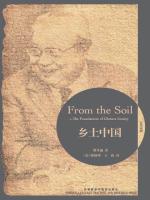On the “From the Soil” of “Soil”
Vickie_tt
From the Soil was written by Fei Xiaotong in 1948. It is one of the most
important representative works of theoretical research on traditional
culture and social structure of Chinese rural society. The book consists
of 14 articles, covering the local social and cultural environment,
traditional social structure, power distribution, moral system, rituals,
blood and geography, and other aspects. In Rural China, the author uses
plain and concise language to summarize and analyze the main
characteristics of China's grassroots society, and comprehensively
presents the face of China's grassroots society. The book mainly
discusses the pattern of differential order, the difference between men
and women, family, blood and geography, etc. What interests me the most
is the understanding of "Soil" in "From the Soil".
What is soil? The literal translation is rural land. In my opinion, it
is not only the land in the countryside, but also the "root"
of the Chinese people. The development of the Chinese nation begins with
the land and takes root in the land. The rural people, who are
"natives", are the foundation of Chinese society. The
grassroots of Chinese society are rural. People are rooted in the
ground, not moving. "Soil" is an inalienable part of the
history of the Chinese people, and it also constrains the people's
thinking and life. About the agriculture differs from both the
pastoralism and industry. People cannot live without the land; they are
necessarily connected it. Pastoralism is following the water and grass;
they can move to everywhere what they want. And the industry can choose
where they live, and it’s easy to move. Farmers have settled on the same
land for generations and have no way to leave. They will not leave their
soil except because of droughts, floods and wars. That's why people say
that backward and sedentary. In the stereotype of city people,
"Country people are stupid" seems to be the biggest reason for
us to laugh at them. This proves that we do not see the problem
comprehensively, that we live in an environment where we have access to
written knowledge more easily than the children in the country, and they
acquire knowledge on the land that we do not have. It is too one-sided
to judge whether they are stupid by their ability to acquire words. In
rural society, they are face-to-face communities, and they have no great
need to communicate with words. Often face to face, they will have a
variety of ways to communicate. They get what they want by word of
mouth. The "Soil" of rural society is only the difference in
lifestyle and the different tools they use. There is no such thing as
rustic and fashionable in the countryside and the city, but the way of
life is different. A lot of the time we hear the phrase "The
countryman is unreasonable". Why is that? In fact, it is because
the rural society is ruled by rituals. Many people will think that the
countryside is a place that is unmanaged, and the people in it will not
be reasonable. Actually, the countryside does not have various
provisions to restrict everyone's behavior like a society governed by
the rule of law. It is a tradition of the rural society to maintain
"etiquette". Unlike a society governed by the rule of law,
people do not have clear terms governing what they can and cannot do.
But they have their own rules of conduct. Can we say that the rednecks
are unreasonable? Actually, no, it's just that we don't follow the same
system. It's just that the code of conduct that they have passed down
from generation to generation has been engraved in their bones. The
"soil" in "From the soil" is actually not rustic. It
is the land, the way of life, the habits of behavior, etc., which may be
diametrically opposed to the city based on the land. It is not that we
can use the rustic atmosphere alone to negate the system of life and
behavior that has been passed down from generation to generation in the
rural society for thousands of years. China has been born and lived on
the land for thousands of years, and we have taken root in the land of
China and flourished. We have always loved this land deeply. With my
curiosity to read the whole book, I gained a deeper understanding of
China's rural society. This book is actually quite difficult for me to
read. A lot of rare words, and also uses a lot of Western-style reading
comprehension translations. The whole book is also divided into many
chapters, and each point is listed in different categories. The whole is
clear and well-founded. It also gave me a different perspective on
China's history from ancient times to the present. Of course, the
obscurity of words is also a big reading problem. After reading the
whole book, I think that when reading, we need to grasp a certain
foundation of historical materials in order for us to better understand,
and it is best to read the bilingual version in Chinese and English.
Reading the two versions together will give us a deeper understanding of
the book.



 京公网安备 11010802032529号
京公网安备 11010802032529号